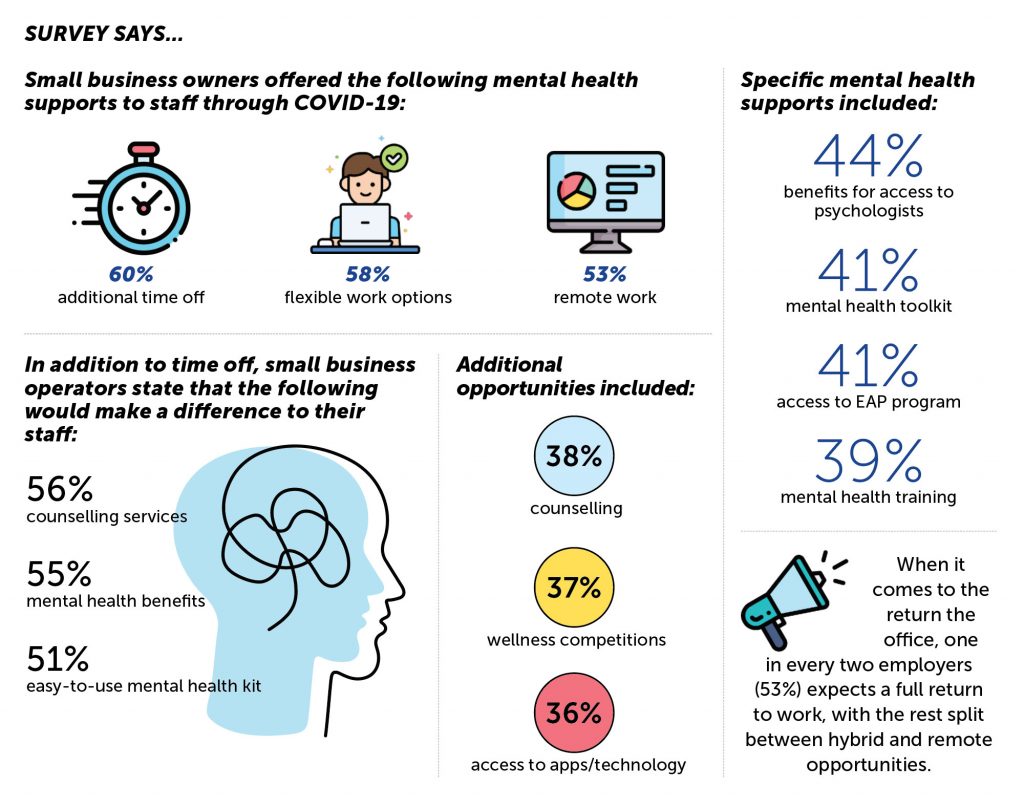

Features
Benefits & Pensions
Economy
Mental Health
Right-sizing mental health solutions for small business
In partnership with

 Photo: Moyo Studio/Getty Images
Photo: Moyo Studio/Getty Images It began as a secondary issue at the onset of the COVID-19 pandemic, but as time passes, it’s quickly becoming a bigger priority.
Mental health is now a major talking point at workplaces across Canada, but can be specifically daunting in the context of small business.
Despite emergency government support, small business operators across Canada have borne the brunt of COVID-19. Issues of mental health, burnout and increased stress are all associated with pandemic restrictions and lifestyle alterations.
Looking back at the past 18 months, more than half of small business owners in Canada (55 per cent) say mental health benefits would make a difference to their staff, according to an exclusive survey conducted by Talent Canada.

Talent Canada’s online survey was open from Aug. 17 to 30. In total, 277 workplace leaders responded, including 120 representing small business. (Images: FLATICON.com)
“During the pandemic, everyone had to address the situation in real time as things were unfolding,” said Lisa Villani, regional vice-president, Central and Atlantic, Group Benefits for Sun Life in Toronto. “I think business owners did the best they could with the information and resources available to them.”
Small business owners wear many hats and bear the weight of much stress, she said. “As the pandemic wore on, we saw a significant need from our clients when it came to mental health supports.”
Group benefits providers assisted by offering resources on managing disruption, maintaining organizational health, understanding employee anxiety, leadership skills, and more.
Overwhelming stress has been a major concern for independent business owners through COVID-19, according to Corinne Pohlmann, senior vice-president of the Canadian Federation of Independent Business (CFIB) in Ottawa. “There’s no doubt this was something that many of them have, obviously, never faced before.”
Mental health benefits survey, roundtable
According to the national survey conducted by Talent Canada, in partnership with Sun Life, small business owners used a variety of measures to alleviate the psychological pressures staff faced through the pandemic, including additional time off (60 per cent), flexible work options (58 per cent), and remote work (53 per cent).
The online survey was open from Aug. 17 to 30. In total, 277 workplace leaders responded, including 120 representing small business.
On Sept. 13, Talent Canada hosted an exclusive roundtable in partnership with Sun Life to explore the survey results, and discuss the wider context of the future of mental health benefits for small business.
COVID-19 has proved to be a very difficult time for not only workers, but employers as well, said Michael Wood, a longtime small business owner in Ottawa, and professor at Algonquin College.
Much of the stress felt was internalized, he said.
“We’re looking two, three, four, five years down the road for recovery for many small business owners, and right now, mental health across the country is definitely struggling.”
And while negatively affected businesses felt the stress of layoffs and lost revenue, organizations that excelled through the pandemic experienced different pressures in terms of employee safety and continuing productivity, said Mario Malatesta, vice-president, partner relations, at MGA Distribution in Mississauga, Ont.
“That’s an enormous amount of stress — to be able to continue productivity and keep everybody safe, at a distance.”
Making mental health practical
When it comes to small business, are mental health benefits practical?
A large proportion of small employers struggled with attempting to manage employees’ needs through the pandemic, said Pohlmann, citing issues around time constraints, budget and resources.
Where small business owners have an advantage, however, is in terms of close relationships between employer and employee, she said.
“At the end of the day, it comes down to having that communication between an employer and employee that’s going to help anybody dealing with a mental health issue.”
According to Malatesta, benefits providers have worked hard to provide options to employers during COVID-19 — be that employee or employer assistance programs, or digital health platforms like Lumino Health, and virtual care solutions, such as Lumino Health Virtual Care — both from Sun Life.
“Those are some wonderful, additional benefits that have been add-ons, that aren’t necessarily a huge cost,” he said. “Because a benefits program — especially to smaller businesses — it’s an expensive item for them to add on to their bottom line.”
Pushing through a pandemic
Regardless of their time constraints through the pandemic, employers did work to assist their workforces through the unique pressures of COVID-19, according to the survey.
Specific mental health supports included: benefits for access to psychologists (44 per cent); mental health toolkits (41 per cent); access to employee assistance programming (EAP) (41 per cent); and mental health training (39 per cent).
“It’s been a really tough time,” said Wood. “What it comes down to is: if these companies are able to do this… this is great.”
Many employees remain at heightened stress levels as the virus remains prevalent in communities, coupled with children returning to school, he said.
“All of the different things that small businesses can do, that they’re able to do, is definitely amazing and well appreciated by everybody.”
The longer the pandemic lasts, more employers can expect an increase in mental-health related claims and other burnout-related issues from employees, said Malatesta.
“I don’t imagine how anybody could disagree — mental health has skyrocketed,” he said. “The flexibility that employers are allowing, more now than ever, is huge… That will help the stress levels go down, because they have those options.”
Long hours and burnout continue to be factors in mental health issues, added Wood, noting that listening to employees with empathy would go a long way.
“From the owner’s perspective, all the way down to the staff, people are burnt out. They may be looking for changes.”
Right-sizing mental health benefits
At present, mental health benefits consist of solutions such as self-guided online sessions, virtual or in-person counselling, and customizable spending accounts, Villani said during the roundtable discussion.
“Providing flexible mental health support that fits an employee’s unique needs can empower them to take action — and to take it earlier to improve their mental health and wellness,” she said.
“It’s critical to make it easy for all employees to have access to diverse benefit and wellness solutions — whenever and wherever it serves them best.”
Higher maximums on mental health services are also encouraged to provide “additional and adequate treatment,” said Villani, noting providing options to employees is best practice.
As the conversation around workplace mental health intensifies, benefits associated with mental health may go mainstream, said Pohlmann, potentially affecting job negotiations in the future.
“From an employer perspective, it makes a lot of sense to try to do what you can to help people through (mental health struggles),” she said. “From a small business perspective, it will be a bit more challenging if it does become a deal breaker.”
Options aren’t plentiful for small employers right now, and packages are “quite expensive,” said Pohlmann, noting many small organizations are enduring budgetary constraints at this time.
“Obviously, whenever there’s a shortage of labour — which is something we’re also trying to deal with right now — these types of things become more important, because employees can ask for them, and they do,” she said.
A variety of plan designs do exist, said Malatesta, even if it’s as simple as a health-care spending account. “Maybe you walk before you run.”
“The introduction of employee assistance programs to more companies that are on the small business side, I think is something that we have to see more.”
COVID-19 effect on workplace
Despite the obvious issues and tragic consequences associated with COVID-19, employers responding to Talent Canada’s survey also listed a variety of positive impacts, including: higher productivity, increased flexibility, more time for family, strengthened mental health programs, and an increased awareness of mental health issues.
“The pandemic has proven that people can work from home,” said Wood. “It gave people an opportunity to reinvent themselves; it gave people an opportunity to reinvent their business.”
There are indeed some silver linings, added Pohlmann.
“It’s fast-tracked a lot of businesses to think about what else they can do. How else can they broaden their business to keep some sort of revenue coming in?”
These improvements won’t go away post-pandemic, she said. “I think that’s a good thing.”
“It’s created, from a business perspective, new opportunities… I think it also helped broaden the understanding of what we need to do to help people through a pretty stressful time,” said Pohlmann.
“When you have basically millions of people going through it at the same time, suddenly it becomes a much more important issue to tackle,” she said.
“Hopefully, going forward, that momentum will continue.”
The full virtual roundtable conversation is available below:
SPONSORED CONTENT

The future of mental health benefits for small business
Small business owners wear many hats, but the pandemic has strained their capacity like never before.
Lockdowns, workplace safety, supply chain interruptions – the list goes on. Many of you and your employees had to pivot quickly to survive. You did this while dealing with pandemic restrictions that caused significant life and work pressures. This may have dramatically increased stress levels and tested mental health limits.
Meeting the challenge
Remarkably, everyone showed tremendous resilience and perseverance. To help employees navigate the changing situation, many of you offered additional mental health supports:
- additional time off to employees
- flexible and remote work options
- access to psychologists through a group benefits plan.
As the pandemic continues, mental health impacts will continue to loom. We know that after traumatic events, many mental health issues surface later.
The good news is that there are additional resources – many free – that can support employee mental health.
Mental health supports is good for business
Different businesses have different needs. But one constant is the leadership support needed for promoting a strong mental health culture.
A great place to start is to use the free resources available to you and your employees right now.
- Mental Health Strategy Toolkit. Our free online toolkit can help you develop the fundamentals of a workplace mental health strategy. It provides the ‘how to’ versus the ‘what’ for building a strategy, with actionable resources and specific guidance. You can access the toolkit at sunlife.ca/mentalhealthstrategy.
- Online manager training videos. We offer a suite of five online manager mental health training videos. Through these free self-teaching modules, your people leaders learn to:
- identify potential mental health issues in their workplace
- communicate effectively
- help build a healthy environment
- identify and address the stigma related to mental health issues.
- Lumino Health. This is our free digital health platform. It offers health resources to help employees and their families learn how to better manage and improve their mental health.
If you offer a benefits plan, there are many other supports available. These include psychological counselling, virtual care, and more.
Mental health matters – and you can make a difference
Positive strategies can play an important role in keeping employees healthy and at work. They can also yield cost savings for business owners from improved productivity and reduced absenteeism.
The pandemic is going to have a lasting impact on all of us. We need to find better ways to support each other, especially at work. We encourage you to visit sunlife.ca/mentalhealth for free resources and information.
When you’re ready, talk to your advisor about building a benefits plan to support the mental well-being of your employees.
To learn more about Sun Life, visit sunlife.ca.
Print this page